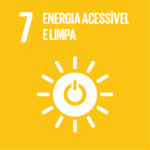Strategic Planning
In compliance with the Climate Change Policy, Copel’s Strategic Planning contemplates aspects such as climate scenarios and risks, business prospects, as well as the evaluation of emissions and the development of a neutrality plan for the coming years.
As an unfolding measure of the strategic planning, Copel is studying to diversify its renewable matrix and the offer of new services, which represent a challenge for the Company, both for the execution of the activity and for economic feasibility.
Within the possibilities, Copel manages demand, improves energy and operational efficiency, implements distributed generation by means of new wind power plants and photovoltaic panels, makes use of energy from biomass and biogas, implements smart electricity grids, stimulates the use of electricity for the transportation and mobility sector, as well as expanding centralized renewable energy generation ventures.



Commitments and Goals
Commitments
As a resulting measure of its Climate Change Policy, Copel shall comply with the following commitments:
| Commitments | Strategy |
Performing GGE emission mitigation within the Company processes and activities. | ● Fleet: fostering renewable fuel use and electric car usage. ● Developing energy efficiency, including: renovating air conditioning system, lamp change for LED lamps, etc.). ● Sponsoring projects that aim at decreasing GGE emission or that enable carbon sequestration. ● Keeping generation matrix predominantly with low emission sources. ● Developing renewable power generation projects. ● Fostering Distance Learning and on-line meetings. ● Intensifying actions for technical loss decrease by means of network automation. ● Expanding the power park with new power sources with low GGE emission. ● Releasing at most 0.0890 tCO2/MW.h of generated power by 2025, considering Brazil ́s expansion power and the possible input of new undertakings within the Company power matrix. |
Qualifying and fostering value chain to mitigate and GGE emissions. | ● Attending forums, discussion groups and alike related to climate change. ● Disclosing yearly, in Public Records, Copel GGE emission inventory, checked by a third party. ● Reporting Copel GGE inventory third party inventories. ● Sponsoring electric car and bike use in Paraná State. ● Implementing electrified rail in BR 277 highway and fostering partnership with other power companies in SC and SP highway connection. ● Fostering electric service station opening in urban centers. ● Fostering clean energy generation and marketing. ● Developing Energy Efficiency actions. ● Intensifying Smart Grid projects. ● Developing Distributed Generation actions. ● Developing R&D projects, including energy assets distributed to the power system optimization and efficiency. ● Searching for green bond sources. ● Studying the feasibility of marketing REC (Renewable Energy Certificates) projects. ● Disclosing developments achieved in R&D surveys and projects related to climate change. |
Fostering adaptation project execution concerning climate change impacts in Company business, aiming at decreasing risks and searching for new business opportunities. | ● Considering that adaptation measures proposed in risk assessment performed in the Company. ● Incorporating adaptation measure for each risk assessment performed, in order to enable GGE emission mitigation. ● Incorporating climate change variable in risk analysis and new business opportunity. ● Deploying Smart Grid systems to renovate the distribution system and decrease service offer vulnerability due to climate change. |
Net Zero Ambition Commitment
The Net Zero Ambition Commitment is an accelerator initiative to challenge and support Global Compact member companies to set robust, science-based targets to reduce greenhouse gas (GHG) emissions and thereby ensure that the company works with the urgency and ambition needed to contribute to curbing the rise in global temperatures.
Goals
As a resulting measure of its Climate Change Policy, Copel approved the following goals:
2019-2022 Goals
Mitigation Goals
Absolute decrease goals
| Scope | Goal | Year % | Term |
| Scope 1 | Decreasing fleet emissions in 2% (base year: 2017) | 0,5% | 2022 |
| Scope 2 | Decreasing power consumption in 5% (base year: 2017) | 1,25% | 2022 |
Offset goal
| Scope | Goal | Year % | Term |
| Scope 1 | Offset Copel Telecom Scope 1 year emissions in 100% | 100% | 2022 |
Relative reduction targets
| Scope | Goal | Year % | Term |
| Scope 1 | Reducing in 4% Copel GeT Scope 1 emissions / generated power | 1% | 2022 |
| Scope 1 | Reducing in 5% Copel DIS Scope 1 emissions / designed demand | 1,25% | 2022 |
| Scope 1 | Reducing in 5% Copel Telecom Scope 1 emissions / customer | 1,25% | 2022 |
| Scope 2 | Reducing in 0.1% Copel DIS technical losses | 0,5% | 2020 |
| Scope 2 | Reducing in 1% Copel power consumption / usage | 0,25% | 2022 |
Adaptation Goal
| Goal | Year % | Term |
Assessing climate change risks in at least one undertaking for: Generation, Transmission and Distribution. | Years 1 and 2. Vulnerability survey Years 3 and 4. Adaptation measure proposal | 2022 |
Climate Change Responsibility
Climate issue responsibility at Copel is assigned to the Board of Directors, the Sustainable Development Committee and the chairperson, as provided in the bylaws, that assigns as skills enforcing the Company business overall guidance and resolve on the subject, setting forth goals and priorities, searching for development with sustainability, and also approving sustainability policies and risk management. What is more, the chairman is responsible for coordinating the responsibilities and assignments related to the Company managements.
The Governance, Risk and Compliance Officer is responsible for social, environment, climate change and corporate governance topics in controlled companies and in other corporate interests.
Climate Change Commission Coordinator is the sustainability and governance superintendent, and he/she is chosen as directly subordinated to Governance, Risk and Compliance Officer, and he/she is responsible for leading corporate goal progress follow-up; identifying vulnerabilities and proposing adaptation measures; assessing risks and opportunities related to climate change, as well as reporting to the Top Management on the Company emission management results.



